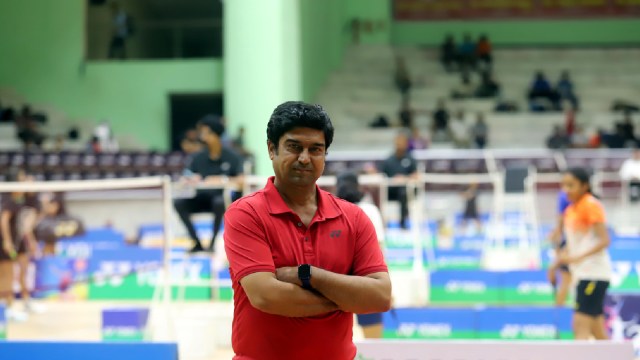
Finding the perfect balance between ensuring smooth flow of play for shuttlers and sticking assiduously to rules, is what 51-year-old Parijat Natu is tasked with. As deputy chief referee of the Yonex Sunrise 31st Smt Krishna Khaitan Memorial All India Junior Ranking Prize Money Tournament, when he is called by an umpire for a line call dispute between two players, he has the wise words of his distant uncle, Girish Natu, to fall back on.
Natu Sr, the first Indian umpire to officiate at Olympics in Beijing in 2008 and the first Indian BWF referee – a school principal-like figure in international badminton, revered by fellow officials and feared by players. “Game is always for the players. And that’s supreme for umpires and officials,” the nephew was told. “But then if one has the conviction and is making a decision, then whatever the player says should not impact the line judge or the umpire’s decision based on all the evidence. And that’s what I follow as a national level referee too,” says Parijat while speaking with The Indian Express at the Tau Devi Lal Sports Complex
While his uncle had started his umpiring journey in badminton more than 43 years ago, Parijat’s started as a player in Sangli. Trips to visit his uncle at Pune would also see him watching Natu officiating in local tournaments in Pune in the 1980’s but Parijat’s focus was to build a career in badminton. A couple of state titles apart, there was no headway and he appeared for his first umpires exam in 1997.
While his uncle was the tournament director in this year’s All England Championships apart from officiating as deputy referee in Paris Olympics, Parijat’s counts officiating in 2017 Nationals finals involving the double’s pair of Satwiksairaj Rankireddy and Chirag Shetty as his high point.
“My uncle also taught me to never see players as stars. Just see them as players like you are officials, nothing big or nothing lesser in any role. There are 17 rules in the BWF rules booklet – the best guide. Once in a match between an Indonesian and Malaysian at 20-19, one player was delaying receiving the serve. So he awarded the winning point to the server. There was a hue and cry but rules are rules and that’s what he did,” Parijat recalls
With the spotlight on them and ill-tempered players, they need to be crystal clear on rules.
“While trying to win, players use delaying tactics like diving on court to get it wiped, or drip sweat to counter fatigue. But my job is to be as reasonable as I can and see that no rules are taken undue advantage of. That’s our mantra,” concludes Parijat.



